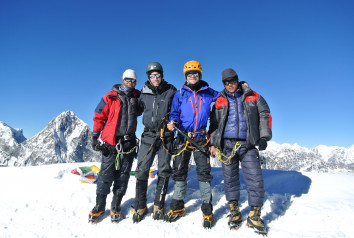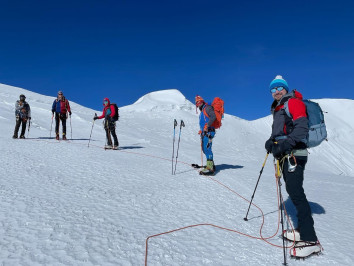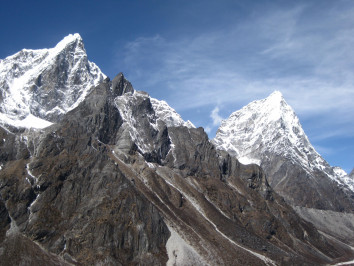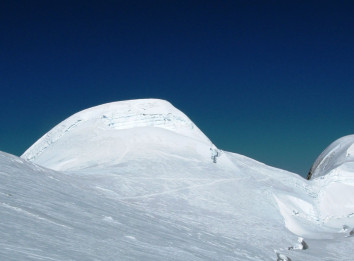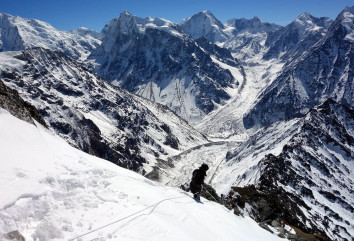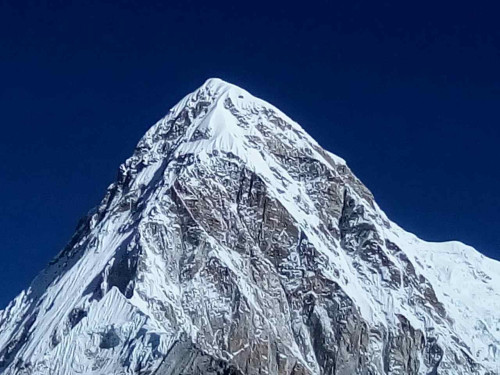Attractions of Island Peak climbing
- Spellbinding route to Island Peak along the Imja Valley.
- Witnessing the massive Nuptse face en route to Island Peak.
- Inspiring panorama of Everest, Lhotse, Nuptse from top of 6,189 metres Island Peak.
- Breathtaking view of glaciers, snow ocean, and moraines streaming down from several 7,000 metres and 8,000 metres peaks.
- Perfect learning peak for beginner climbers who want to pursue their mountaineering career.
- Perfect for Everest Base Camp trekkers who seek wilderness of adventure by going further to the summit of Island Peak.
- Experiencing high altitude trekking with tented overnight at Imja Tse base camp.
At 6,189 metres, Island Peak stands tall as an island amid an ocean of snow of Khumbu. Seeing it as a snow island from Dingboche, Eric Shipton and his expedition group named it Island Peak in 1951. Termed Imja Tse later in 1983 by Nepal Mountaineering Association, the name remained as trekker’s favourite “Island Peak'', and has been a popular climbing destination among amateur climbers. Precisely, the extended descending of Lhotse Shar's southern end is what this peak is all about.
Island Peak climbing will be the best fit for you if you are among many aspiring climbers to summit a technical 6000 metres peak. Why? Well! You'll get the apt ideas of using crampons, walking on a ladder over crevasses, walking along the fixed lines in the mountains, etc.
On top, climbers and trekkers still use the summit route discovered in 1953 by Edmund Hilary and Tenzing Norgay. Island Peak still holds its standard high among several peaks for the Everest summit preparation.
Island Peak Climb - Itinerary Overview
We'll take a flight from Kathmandu to Lukla and continue our trek to Chhukung and Island Peak Base Camp. We'll hike on the Everest trekking trail until Chhukung. The lush forests, suspension bridges, Dudh Koshi River, and Namche Bazar are the major attractions of the hike. Also, throughout the trial, we'll observe the majestic mountains of the Everest region.
We'll ascend at a gradual pace which helps us acclimatise. Also, our acclimatisation at Namche helps us to adapt to this environment. Our body becomes perfectly adapted to this altitude by the time we reach the Island Peak base camp.
For the preparation and further acclimatisation, we'll hike to Chhukung-Ri at 5,550 metres. Here, you'll sightsee the humongous South face of Lhotse. Some trekkers also prefer the hike on Kongma La Pass for excellent viewing of the Khumbu glacier. Pokalde peak climb is also an option for you, but it will add extra cost.
For Island Peak climbing, you'll have to learn basic mountaineering skills like walking on glaciers and scrambling on snow-filled terrain. Thus, good alpine techniques can only make the Island Peak ascent and descent comfortable.
But, you can prepare for these techniques before joining the team. Our Sherpa and Climbing guides will teach you the necessary climbing techniques for this expedition. Depending on the weather, summit, and return to Island Peak takes eight to nine hours. Thus, you'll be crossing some crevasses, walking by clipping Jumar on a fixed line, and adjusting on the narrow ridges.
We at World Expedition Nepal operate Island Peak climb and expedition for standard 19 days. It includes two days of Kathmandu's stay, sixteen days of trekking/climbing, and one day as a farewell.
Also, there are many of our previous clients who wished for the Everest base camp trek before heading to Island Peak. If you want an Everest base camp trek, we'll arrange two extra days for it. But, you have to inform us before heading on this tour.
Summiting Island Peak - An insight
From the beautiful Chhukung village, we'll hike for four hours to reach the base camp of Island Peak. You'll notice the pristine Imja Tse lake en route to base camp. Drained to some extent, Imja Tse is a beautiful lake en route to the Island Peak base camp. People believe that Imja Tse, due to global warming, might burst anytime and sweep the Chhukung village.
Overall, the Island Peak climb and back to the base camp take around 9 to 12 hours. The hiking trail is a mix of rocky terrain and scrambled snow. There are some crevasses and clipping points, where you have to clip and climb carefully. The climb in the Island Peak summit push is the 300 metres steep headwall near the summit that is arduous. But to make hikes safe, rope fixing teams fix rope every year. Here, you'll use your knowledge if clipping Jumar on the fixed rope. The exposed summit of Island Peak is inadequate and accommodates only four to five people at one time.
From the summit of Island Peak, you'll get 360 panoramic glimpses of every available mountain in the Everest region. Everest, Lhotse Middle, Lhotse, Lhotse Shar Nuptse, and Makalu appear exquisite. Also, Ama Dablam and Baruntse to the south of the Island summit look inspiring. The tiring summit push is worth the majestic sightseeing.
Island Peak Summit - Things to know about terrain
You have to use your crampons from the crampon point because there will be more snow on the trail. Also, you'll encounter some traces of glaciated terrain to walk over. The well-marked climbing route and ladder over deep crevasses make the path identification easier.
The 300 metres ridge is where you have to be more cautious. Here, you'll use the anchors, but they may slip due to the condition of the fixed rope. Thus, to cross this bridge takes around two hours. There will only be one fixed line for ups and downs. So, it often gets busier.
Like ascent, you have to be extra cautious on descent. The abseil is easier for experienced guides and climbers but becomes difficult for first-time climbers. You can overtake at some points but don't forget to descend with caution.
In return, the sun melts and loosens the ice and snow. It causes the movement in glaciers and loosens the ladders over crevasses. You must follow the cautious guidelines for a safe return. There's no need to panic because our expert guides will be with you throughout this expedition.
Island Peak Climbing - Past climbing experience
Unlike Chhukung Ri and Mera Peak climbing, scaling Island Peak requires some mountaineering experience. You must know about putting the crampons and properly walking wearing them on the snow and glaciers. The apt use of an ice axe, tying the harness, and clipping on the man rope are the must-know techniques for this expedition.
Try explaining your Sherpa and Climbing guide about the experience you have. They will teach you various techniques based on your previous knowledge. To abseil the headwall below the summit, you must be skillful in the proper use of the jumar attached to your harness. You're not allowed to make the abseil at this ridge without any idea of using jumar and clipping the man rope. For this, previous climbing experience is a must.
Focus is the key while summiting Island Peak. The wind speed and steep offs on either side of the ridge may cause vertigo.
Thus, prepare yourself with adequate alpine training courses before heading to Island Peak climbing.

 Recommended On
Recommended On
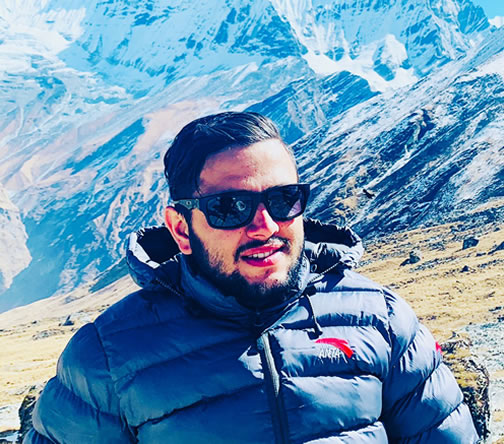

 Trip Map
Trip Map


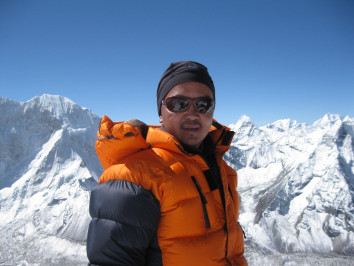
 6000m Peak Climbing , Nepal
6000m Peak Climbing , Nepal  29 Days
29 Days  US$3400
US$3400



-1.JPG)
